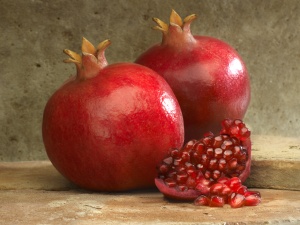POMEGRANATE
Pomegranates have recently become a very fashionable fruit. The pharmaceutical, cosmetic and food industries have “discovered” their countless health benefits.
García Mateo & Sinova and its Peruvian partners have pioneered the out-of-season cultivation of the variety Wonderful. Since then, the consumption of pomegranates and their reputation for health and haute cuisine have grown exponentially.
REASONS TO EAT IT
- The antioxidant effect of pomegranates slows down the ageing of the arteries and prevents heart attacks
- Pomegranates are good for people with high blood pressure
- Pomegranates are recommended for cases of gout, excessive uric acid and obesity.
VARIETIES
The most popular variety of pomegranates currently on the market is Wonderful, which also has many sub-varieties.
PACKAGING FORMATS
We sell our pomegranates in 4 kilo boxes, covering each fruit with a mesh. We transport them by air or sea, depending on when they were harvested.
Second class quality is accepted for pomegranates if the seeds will be separated for industrial use.
BRANDS
We distribute most of our pomegranates under the brand: TUCANO.
NUTRITION INFORMATION
Pomegranates have a high carbohydrate content and contain vitamins C, B1, B2 and B3.
| values per 100 gr | |
|---|---|
| Calories | 68 Kcal. |
| Protein | 0.95 gr. |
| Carbohydrates | 17.17 gr. |
| Fibre | 0.6 gr. |
| Calcium | 3 mg. |
| Iron | 0,3 mg. |
| Vitamin C | 6,1 mg. |
| Cholesterol | 0 mg. |
They are also rich in potassium, phosphorus, manganese, calcium, iron and magnesium.
They contain citric acid, which gives them their characteristic sharp tang.
The powerful antioxidant effect of pomegranates also helps to prevent cancer.
ORIGIN AND CHARACTERISTICS
Pomegranate trees were grown in Egypt from the 18th dynasty, in the second millennium BCE. However, pomegranates were introduced to Europe by the Arabs.
They are grown in tropical and sub-tropical regions. The fruit is round in shape. Inside, thick inedible membranes divide the interior into receptacles full of seeds. The tough inedible skin is usually a russet colour. Pomegranate seeds are usually eaten raw. The ruby-coloured ones are the most appreciated.
STORAGE AND CONSUMPTION RECOMMENDATIONS
Pomegranates which will be eaten immediately are best at room temperature. They can be kept in a refrigerator for 7 - 10 days. Ideal temperature: 5 - 7 ºC
Eaten in the natural state or added to salads, as a decoration for other dishes, in fruit salads or in sauces.





